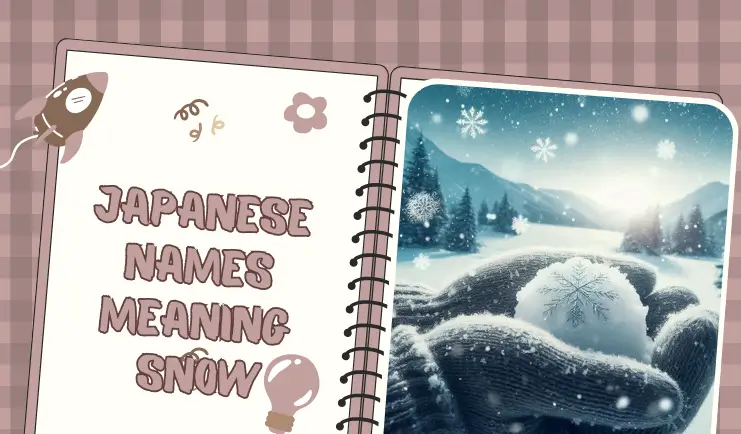Japanese names inspired by snow reflect the quiet beauty, purity, and grace of winter. These names capture qualities such as serenity, endurance, and calm, making them ideal for children born during colder months or for parents who appreciate nature’s gentler elements.
Snow-themed names have become popular not only in Japan but also among parents worldwide who value their elegant simplicity and cultural depth.
In Japan, names often align with seasons, and winter brings poetic associations tied to snow, frost, and ice.
Choosing a name with these elements provides a meaningful way to connect with the peacefulness of winter while embracing Japanese traditions.
This article presents a thoughtfully categorized collection of snow-related Japanese names, offering a variety of options to match your child’s personality and spirit.
Contents
- 1 Traditional Japanese Names Linked To Winter Elements
- 1.1 Unisex Japanese Names Meaning Snow And Ice
- 1.2 Rare And Unique Japanese Snow-Themed Names
- 1.3 Cute Baby Names Inspired by Japanese Winter
- 1.4 Nature-Inspired Names Associated With Snow And Frost
- 1.5 Why Parents Choose Japanese Snow Names Today
- 1.6 Tips For Choosing A Meaningful Name With Japanese Roots
- 1.7 Frosty Snow Village In Japan
- 1.8 Conclusion
- 1.9 FAQs! (Frequently Ask Questions)
- 1.9.1 Q1: What are some popular Japanese names that mean “snow”?
- 1.9.2 Q2: Are there any names that combine elements of snow and nature?
- 1.9.3 Q3: What do the names inspired by snow signify in Japanese culture?
- 1.9.4 Q4: Can snow-related names be used for both boys and girls?
- 1.9.5 Q5: Are there historical or mythological figures associated with snow names?
- 1.9.6 Q6: How can I choose a Japanese name that means snow for my baby?
Traditional Japanese Names Linked To Winter Elements
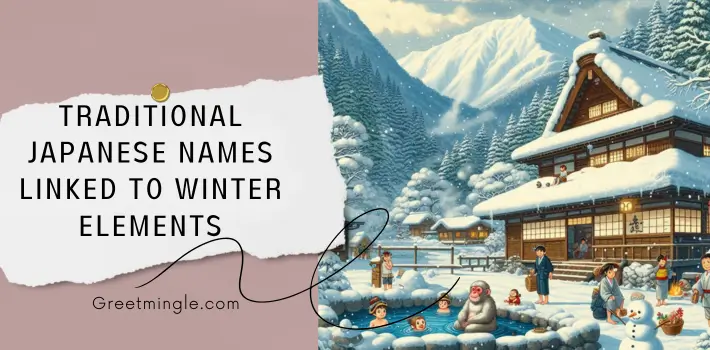
Traditional Japanese names often interweave winter imagery, evoking serene snowfalls and the quiet elegance of icy landscapes.
These names reflect not just the seasonal chill but the enduring strength and grace of individuals, much like the way winter endures before giving way to spring.
They carry a quiet resonance with cultural beliefs, suggesting patience and inner beauty hidden beneath frost-covered surfaces.
>> The Best We Have: Japanese Names That Mean Love Forever
Unisex Japanese Names Meaning Snow And Ice
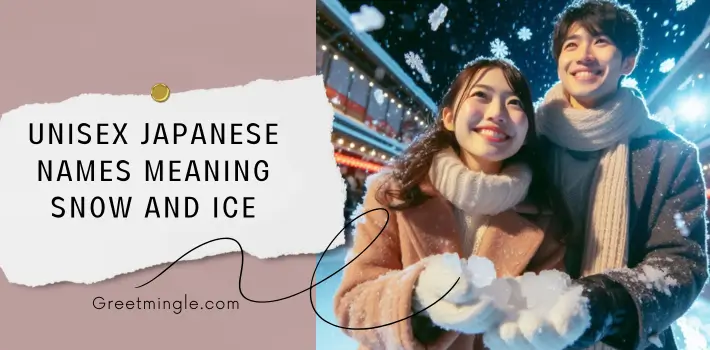
Unisex snow-related Japanese names bring a refreshing neutrality, making them adaptable to any personality or gender. With these names, parents are drawn to the delicate blend of softness and power associated with snow and ice.
The versatile nature of these names reflects modern sensibilities, offering meaningful choices for those who seek a subtle yet distinctive identity for their child.
>> The Best We Have: Japanese Names That Mean Fire
Rare And Unique Japanese Snow-Themed Names
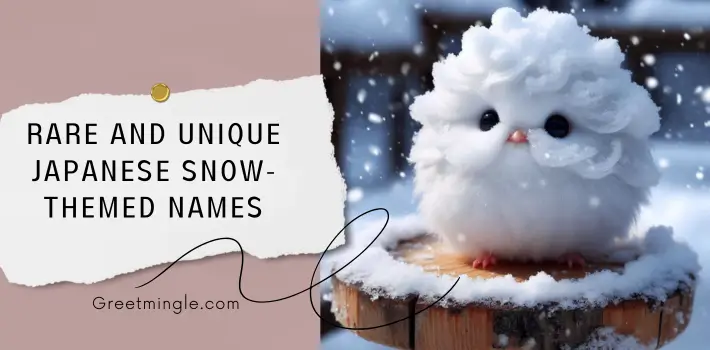
Some Japanese snow-themed names are known for their rarity, offering parents a chance to bestow a name that feels special and truly personal.
These names typically carry nuanced meanings connected to natural phenomena, such as snowstorms or frosted fields, imbuing them with poetic charm.
Their exclusivity makes them an appealing option for those who want their child to stand out without veering away from cultural authenticity.
>> The Best We Have: Japanese Names That Mean Dark Meaningful Choices
Cute Baby Names Inspired by Japanese Winter
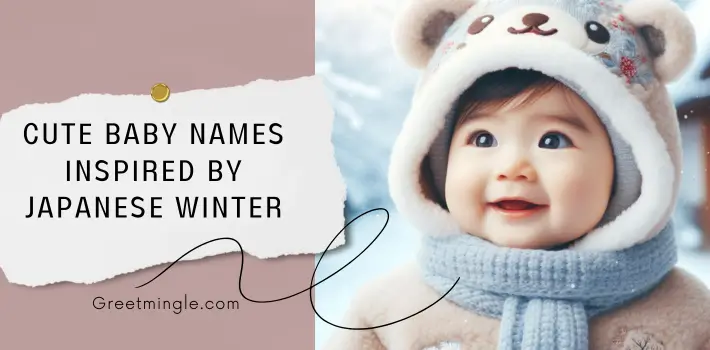
Japanese baby names tied to winter exude a charming playfulness, often capturing the cozy essence of snowy days.
These names are perfect for parents who seek an endearing touch in their child’s identity, reflecting the gentle and cheerful side of winter.
They resonate with the warmth that snowflakes bring despite the cold, offering a delightful balance between cuteness and meaning.
>> The Best We Have: Japanese Names That Mean Shadow
Nature-Inspired Names Associated With Snow And Frost
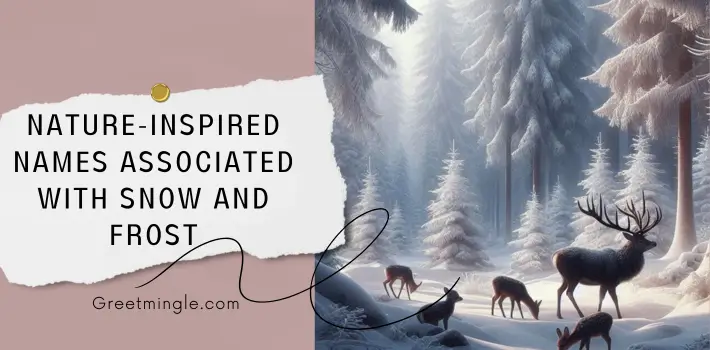
Names drawn from nature reflect not only snow’s tranquility but also its fleeting beauty, highlighting the impermanence of winter moments.
These names often align with frost, snow-covered trees, or frozen rivers, offering a subtle connection to the harmony between people and the natural world.
They appeal to those who want to weave elements of nature’s cycles into their child’s identity, fostering a sense of connection with the environment.
>> The Best We Have: Nicknames For Poppy
Why Parents Choose Japanese Snow Names Today
Many modern parents are drawn to Japanese snow names for their soothing meanings and cultural richness.
These names symbolize peace, endurance, and beauty, making them perfect for children born in winter or families seeking nature-inspired names.
Additionally, snow-themed names offer a subtle way to convey purity and simplicity, reflecting values that resonate with many parents.
As the trend of connecting children’s names with seasons grows, more people are exploring Japanese snow names.
These names provide not only uniqueness but also emotional depth, creating a meaningful connection between the child’s identity and the natural world.
>> The Best We Have: Nicknames That Start With X
Tips For Choosing A Meaningful Name With Japanese Roots
Choosing a name is an important decision, and there are several things to keep in mind when selecting a Japanese name:
Pronunciation matters: Ensure the name is easy for others to say correctly.
Understand the meaning: Research the meanings behind the name to make sure it aligns with your values.
Check cultural context: Some names might have multiple meanings or be associated with specific traditions.
Ask for insights: Consulting with native Japanese speakers can provide additional clarity on pronunciation and usage.
Taking these steps will help you select a name that is both meaningful and culturally respectful.
>> The Best We Have: Nicknames That Starting With Y
Frosty Snow Village In Japan
Conclusion
Choosing a Japanese snow-themed name is a wonderful way to embrace the serenity and elegance of winter. These names offer not only aesthetic appeal but also deep cultural significance, connecting your child to nature and tradition.
From popular and traditional names to rare and unique options, there’s a wide variety of choices to suit every family’s preferences.
Japanese snow names embody qualities like purity, peace, and endurance, making them perfect for children born in winter or for parents seeking a name with meaningful roots.
By selecting a name from this collection, you can give your child a beautiful identity that reflects the tranquility of snow and the charm of Japanese tradition.
FAQs! (Frequently Ask Questions)
Q1: What are some popular Japanese names that mean “snow”?
Japanese names that convey the essence of snow include Yuki (雪), which directly translates to “snow,” and Yukiko (雪子), meaning “child of snow.” Other options like Shirayuki (白雪), meaning “white snow,” and Yukihime (雪姫), meaning “snow princess,” reflect the beauty of winter and its enchanting qualities.
Q2: Are there any names that combine elements of snow and nature?
Yes, many Japanese names combine snow and nature. For instance, Yukikawa (雪川) means “snow river,” beautifully depicting a snowy landscape, while Yukiyama (雪山) translates to “snowy mountain,” symbolizing the majestic mountains blanketed in white during winter.
Q3: What do the names inspired by snow signify in Japanese culture?
Names associated with snow often symbolize purity, beauty, and tranquility. For example, Koori (氷), meaning “ice,” conveys a sense of stillness, while Yukikage (雪影) translates to “snow shadow,” evoking the delicate and ephemeral nature of winter.
Absolutely! While names like Yukiko (雪子) and Yukihime (雪姫) are traditionally feminine, names like Yukiharu (雪春), meaning “spring of snow,” can be unisex, making them suitable for boys as well.
Q5: Are there historical or mythological figures associated with snow names?
Yes, in Japanese mythology, the goddess of snow is often referred to as Yuki-onna (雪女), or “snow woman.” This figure embodies the beauty and peril of snow, which can be reflected in names like Yukihime (雪姫).
Q6: How can I choose a Japanese name that means snow for my baby?
When selecting a name, consider the meaning and the sound of the name. Names like Yuki (雪) are simple yet elegant, while Fuyuki (冬木), meaning “winter tree,” offers a unique twist. Researching the cultural significance behind each name can also provide a meaningful connection for your child.

